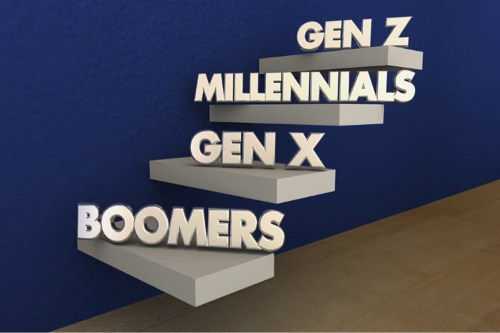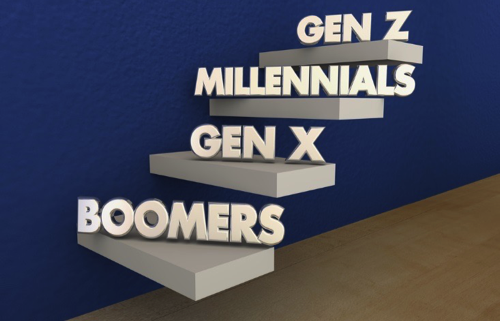Generation Gaps in Business: The Abyss of the Millenniums

Being a business owner, employer or leader in today’s business world requires an awareness of the needs of all the generations in the workforce: the Baby Boomers, Generation X, Y and Z. Whether engaging with staff, clients or stakeholders, understanding the differences in generational values and motivations will lead your business to run more effectively and ultimately improve those bottom-line profits.
Change is inevitable…and it’s happening faster than ever before
Where previous generations were fearful of change and determined to hold onto the status quo, Millennials and the new Generation Z view it as exciting and normal.
Some generations have caused more of a ruckus than others. Today, it’s Millennials (also called Generation Y) that are getting a lot of bad press. Entitled, self-absorbed, and unfocused are typical adjectives swimming in the ocean of negativity that describe our workforce’s majority generation. They cannot survive without their cell phones, have grown up playing video games and expect instant gratification. Many argue that this generation cannot make a decision without consulting everyone they know. Others say they are downright lazy and expect respect just for showing up.
Does all this sound familiar?
It should, because similarly harsh criticisms of each new generation have rung through the rafters since the end of WWII. Think back to the panicked parents when Chubby Checker became popular. Remember the « rebels » created by The Beatles? What about the sacrilegious burning of draft cards? Young upstarts have created chaos with every passing generation, and for that we should be completely grateful.
Each generation brings innovation that shapes our future, and your leadership can make all the difference.
Strategic leadership can tame any circus
 As described in Confident Leadership in 21st Century Business: Bridging the Generation Gaps, taking a leadership role in today’s business world is akin to being a ringleader in a circus. With so many different performers and acts on stage, the ringleader must recognize everyone’s talents and provide them with the tools they need to put on a successful performance.
As described in Confident Leadership in 21st Century Business: Bridging the Generation Gaps, taking a leadership role in today’s business world is akin to being a ringleader in a circus. With so many different performers and acts on stage, the ringleader must recognize everyone’s talents and provide them with the tools they need to put on a successful performance.
Likewise, a business leader must recognize the different generations within their team and modify the tools and tactics to work with each of them. A leader’s role is also about uncovering what makes each generation tick, and using that information to direct their abilities.
In business, the good leader is aware that Generation X prefers carefully funneled information, Generation Y feeds on mentorship and praise, and the upcoming Generation Z needs to understand how their tasks fit in with the whole.
We created the qualities of Gen Y
Nevertheless, while some people may see the Millennial generation as entitled and demanding, let us remember, they were raised differently than generations before them.
We awarded them trophies even when they lost, and we lauded them for every activity they undertook. By buying this new generation multitudes of electronics, we taught them to understand the world of quick responses, and have instant information at their fingertips. They took advantage of every opportunity to learn the complex world of computers, and we praised them for their ingenuity in solving problems in a flash.
Communication styles changed, and as Gen Y began to grow into their teens, the world shifted toward a dramatically new direction – with unprecedented changes equal to those of the Industrial Revolution. We provided cell phones so we could keep in touch with them, smartphones with instant Internet access and computers virtually anywhere they went. They took advantage of that technology to learn how to adapt quickly, keep in touch with the world and with each other at every moment.
Gen Z: A newer generation impacting business
Gen Z has never known a world without smartphones, wearables, and a world of Internet-connected devices. They are being raised amid institutional and economic instability, are heavily influenced by depleting resources and climate change, and are globally connected via social media. They have always had information at their fingertips, are masters of technology and analytics, and are going to further change the way the world does business. Not even the Millennials will be able to easily understand this new shift.
Young people push boundaries. It is what each generation before them has done – and it is right to do so. We have taught them to fearlessly try new things. We’ve encouraged them to uncover innovative ways to accomplish their goals. This generation is brilliant. Business leaders will find that leading Gen Z to find their fit in the organization will help harness their knowledge and enthusiasm, ultimately driving results and improving profits.
Yes, it is difficult to manage people who know more than we do – and yes, they do things differently than we did. Although memories of life without cell phones and personal computers surface from time to time, it is hard to imagine conducting business today without them. There are fantastic possibilities still to come, the ideas for which will undoubtedly be created by the younger generations of the workforce.
Mentor them, guide them, studiously avoid micromanaging them, and be grateful for the courage of the generations of change.
Business author and speaker, Rosemarie Barnes, highlights the challenges that leaders may face when dealing with multiple generations in one workplace. Learn more about how the generation gaps in business are affecting company health and profits in her book, Confident Leadership in 21st Century Business: Bridging the Generation Gaps, now available on Amazon (US and Canada). Rosemarie can be booked for presentations via rbarnes@confidentstages.com. For more information, visit confidentstages.com.






